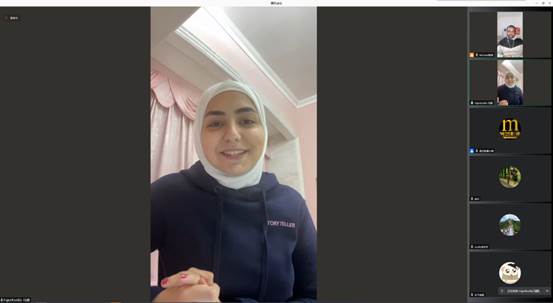On 24 November, the Language and Culture Center of Jiangsu University held a sharing session with the top ten contestants of the "2021 My Story of Chinese Hanzi ". The top ten participants talked about their thoughts and achievements in learning Chinese around the theme of "Learning Chinese is not difficult". Chinese teachers and international students from Jiangsu University attended and listened to the sharing session.

Organized by the Chinese People's Association for Friendship with Foreign Countries and hosted by Xining Municipal People's Government and People's Daily Online, the global finals of the "2021 My Story of Chinese Hanzi" Contest concluded successfully in Xining, Qinghai Province on 12 October 2021. Yang Jing, a Zimbabwean international student from Jiangsu University, won the Grand Prize. The Language and Culture Center of Jiangsu University took the competition as an opportunity to hold this exchange and sharing session, aiming to further promote the enthusiasm of international students to learn Chinese and to promote the exchange and mutual appreciation of civilizations from different countries. This was also a teaching innovation activity carried out by the Language and Culture Center. Jiang Yonghua, Vice Dean of the School of Liberal Arts and Deputy Director of the Language and Culture Center of Jiangsu University, delivered a speech for the exchange; Zhao Xin, Head of the International Section of the Academic Affairs Office of Jiangsu University, gave guidance for the exchange.
Yang Jing, an international student from Jiangsu University, was the host of the event. The top ten contestants showed their talents and shared their ideas: Christoph from Germany talked about his experience of learning Chinese on his own and emphasized that the most important thing to learn Chinese was to speak more. He suggested that we should look at the oracle bones to understand the origins of Chinese characters and to overcome the biggest difficulty in learning Chinese characters. Truth Tanishita from Japan believed that learning Chinese well could not be achieved not only without the help of teachers and classmates but also without one's diligence and hard work. By communicating with more Chinese friends and studying together, we could greatly improve the efficiency of learning Chinese. Charles from Congo (Brazzaville) talked about three reasons that inspired him to learn Chinese: Chinese kung fu movies, the miracle of Chinese development, and the influence of the Chinese market in his country, which made him determine to become a "China expert". The methods he used to learn Chinese were: speaking the language, learning to read, practicing writing skills, and facing "making mistakes" bravely. Jingjing from Kazakhstan said that her motivation to learn Chinese came from her parents' love for China. She advised everyone to develop a spirit of perseverance and not to be afraid of making mistakes. Li Cha from France believed that learning Chinese well would bring him more opportunities, and his years studying in Beijing had made him fall in love with the language. He believed that “love”, “curiosity” and “understanding” were a must to learn one language well. Li Hongyu from Argentina talked about his special relationship with the Chinese language. He believed that if he viewed learning Chinese as a happy thing, he would always enjoy it. He also expressed his idea of promoting the exchange and mutual appreciation of civilizations between China and Argentina. Ma Li from Syria suggested that taking the initiative to integrate into the Chinese language environment, learning Chinese characters, vocabulary, and building a good foundation consistently were the key to learning Chinese well.
The conference was received well by teachers and international students of Jiangsu University, who said that the "Top 10" of the global final of the "2021 My Story of Chinese Hanzi" was a great opportunity to learn Chinese. The participants gave the most vivid Chinese lessons - not only did they provide a valuable learning experience for international students at Jiangsu University, but they also gave Chinese teachers a clearer idea of how to improve their teaching, and gave the Language and Culture Center a stronger impetus to continue its innovative teaching activities.








